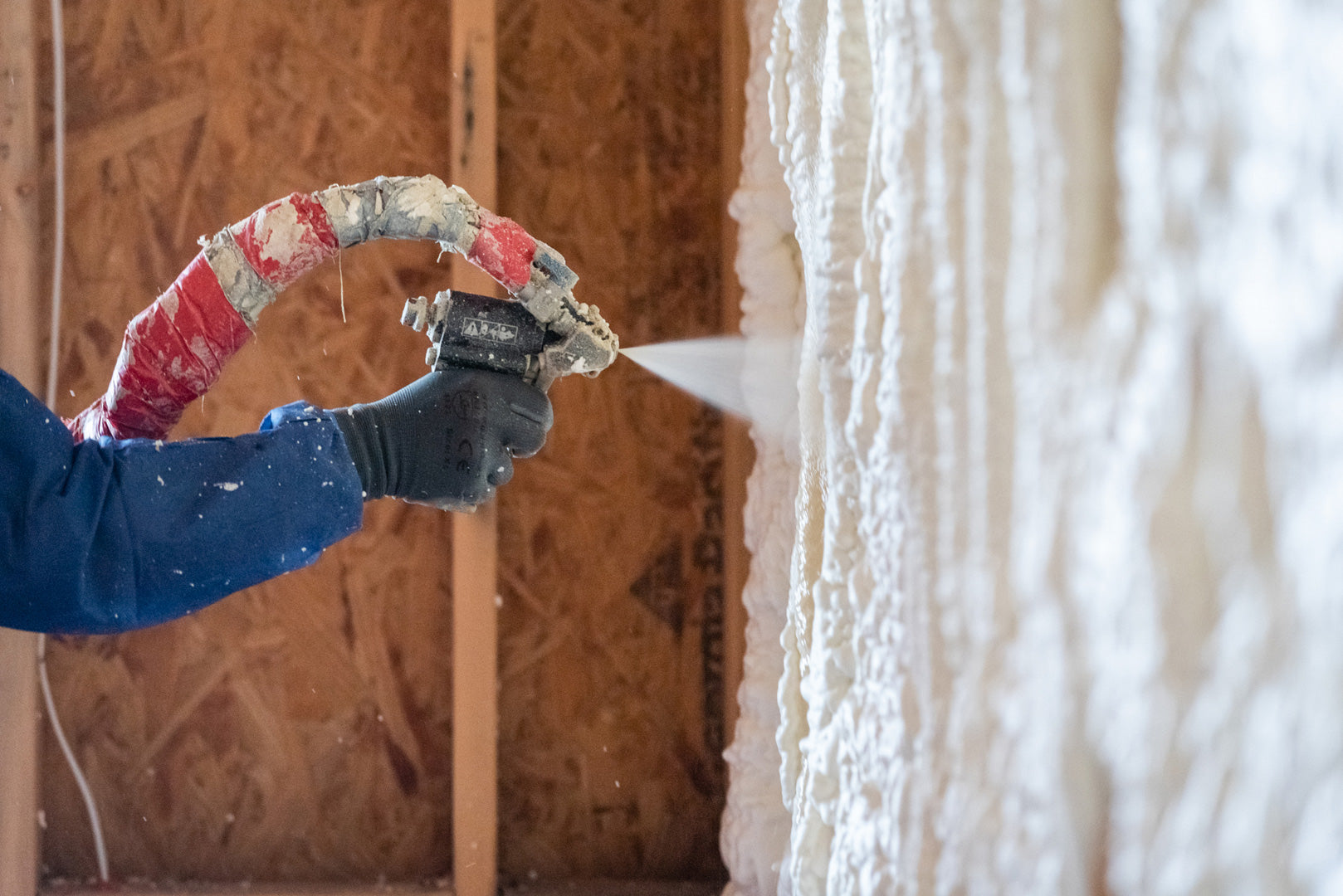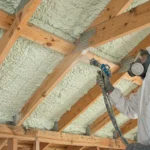Spray foam insulation creates an effective air barrier in Decatur, GA homes by expanding upon application to fill gaps, cracks, and cavities, sealing off air leaks that traditional insulation methods often miss. This tight seal reduces uncontrolled airflow, improving energy efficiency and indoor comfort. Spray foam’s ability to adhere directly to surfaces creates a continuous barrier, blocking both air and moisture infiltration, which is critical in Decatur’s humid climate.
This article provides detailed information on how spray foam insulation functions as an air barrier, compares it with other insulation types, presents key technical data, highlights market facts, and discusses factors homeowners should consider before deciding. You will also find answers to common questions and practical tips to maximize the benefits of spray foam in your home.
How Spray Foam Insulation Forms an Air Barrier
Spray foam insulation is applied as a liquid that rapidly expands and hardens, filling all gaps and seams in the building envelope. This expansion forms a continuous layer that adheres tightly to walls, ceilings, and floors, effectively blocking air movement. Unlike batt or blown insulation, which can leave small voids or compress over time, spray foam maintains its shape and sealing ability.
In Decatur, GA, where humidity and temperature fluctuations can cause air leaks to worsen energy loss and promote mold growth, spray foam’s sealing quality prevents outdoor air, moisture, and allergens from penetrating indoor spaces. By creating a true air barrier, it improves heating and cooling efficiency, reduces drafts, and enhances indoor air quality.

Types of Spray Foam Insulation Used for Air Barriers
There are two main types of spray foam insulation: open-cell and closed-cell. Both can serve as effective air barriers, but they differ in density, moisture resistance, and cost.
| Feature | Open-Cell Spray Foam | Closed-Cell Spray Foam |
| Density | 0.4 to 1.0 lb/ft³ | 1.7 to 2.0 lb/ft³ |
| R-Value per Inch | 3.5 to 3.6 | 6 to 7 |
| Air Barrier Ability | Good, but more permeable | Excellent, highly impermeable |
| Moisture Resistance | Moderate, can absorb water | High, acts as vapor barrier |
| Expansion Rate | Higher expansion, softer texture | Lower expansion, rigid structure |
| Cost | Lower | Higher |
| Suitable Applications | Interior walls, attics, ceilings | Exterior walls, basements, roofs |
Closed-cell spray foam provides a stronger air barrier and additional moisture control due to its density and vapor barrier properties, making it especially beneficial in the humid Decatur environment. Open-cell foam offers cost savings and still effectively seals air leaks but is less resistant to moisture intrusion.
Why an Effective Air Barrier Matters in Decatur Homes
Decatur’s climate features hot, humid summers and mild winters. These conditions cause a high risk of moisture buildup, which can lead to mold and structural damage if air leaks are not controlled. An effective air barrier:
- Reduces energy costs by minimizing the need for heating and cooling.
- Prevents moisture and humidity from entering wall cavities.
- Enhances indoor air quality by limiting outdoor allergens and pollutants.
- Improves occupant comfort by eliminating drafts.
According to the U.S. Department of Energy, homes with properly sealed air barriers can reduce heating and cooling energy use by up to 30%. In Decatur, where energy costs are a significant household expense, this translates into substantial savings over time.

Comparison of Common Insulation Types as Air Barriers
| Insulation Type | Air Sealing Effectiveness | Moisture Control | R-Value per Inch | Typical Use Cases | Lifespan |
| Spray Foam (Closed-Cell) | Excellent | High | 6 to 7 | Walls, roofs, basements | 30+ years |
| Spray Foam (Open-Cell) | Good | Moderate | 3.5 to 3.6 | Interior walls, attics | 20+ years |
| Fiberglass Batt | Poor | Low | 2.2 to 3.8 | Walls, attics | 15-20 years |
| Cellulose Blown-In | Moderate | Low | 3.2 to 3.8 | Attics, walls | 20-30 years |
| Rigid Foam Board | Good | Moderate to High | 4 to 6 | Foundations, roofs | 25+ years |
Spray foam insulation’s superior air sealing properties distinguish it as the best option for establishing a continuous air barrier. Fiberglass and cellulose can trap air within fibers but cannot effectively stop air movement through gaps.
How Spray Foam Installation Works in Creating Air Barriers
Spray foam is applied using specialized equipment that mixes two chemical components at the nozzle, instantly expanding as it contacts surfaces. The installer targets cracks, seams, rim joists, and hard-to-reach cavities, ensuring a uniform, gap-free layer.
Installation Process Highlights
- Preparation: Surfaces cleaned and cleared of debris.
- Application: Foam sprayed in layers, expanding to fill voids.
- Curing: Foam hardens within minutes, forming a solid seal.
- Inspection: Coverage checked to confirm no air leaks remain.
This process is more precise and effective than traditional insulation, which often requires cutting and fitting batts or blowing loose material, potentially leaving gaps.
Technical Data About Spray Foam as an Air Barrier
| Specification | Open-Cell Spray Foam | Closed-Cell Spray Foam |
| Air Permeance | 0.03 – 0.10 perm @ 1 inch | 0.004 – 0.01 perm @ 1 inch |
| Water Vapor Permeance | 15 – 30 perms | 0.05 – 0.5 perms |
| Compressive Strength | 5 to 10 psi | 30 to 60 psi |
| Thermal Conductivity | 0.035 to 0.040 W/m·K | 0.020 to 0.025 W/m·K |
| Application Temperature | 60°F to 100°F | 60°F to 100°F |
| Cure Time | 5-10 minutes | 5-10 minutes |
Closed-cell foam’s low air and vapor permeance values make it a superior air barrier and moisture retarder, ideal for Decatur’s humid conditions.
Things to Consider Before Making a Decision
- Budget: Closed-cell foam is more expensive upfront but offers higher performance and longevity.
- Climate: High humidity areas like Decatur benefit more from closed-cell’s vapor barrier qualities.
- Building Structure: Older homes with many gaps may require extensive spray foam application to seal effectively.
- Code Compliance: Verify local building codes for required R-values and vapor barriers.
- Installation Quality: Proper installation is critical; poor application can reduce effectiveness and cause issues.
- Environmental Impact: Spray foam involves chemicals; consider ventilation during application and choose low-VOC options if possible.
Bonus Tip
Get a professional assessment of your home’s air leakage before choosing spray foam. This helps target areas needing the most attention, optimizing cost and performance.
Common Questions About Spray Foam Air Barriers
Q: Can spray foam insulation cause moisture problems?
A: Closed-cell spray foam acts as a vapor barrier, reducing moisture issues. Open-cell can absorb some moisture, so proper installation and vapor management are important.
Q: How long does spray foam last as an air barrier?
A: When installed correctly, spray foam maintains its air-sealing properties for 20-30 years or more.
Q: Is spray foam safe for indoor air quality?
A: After curing, spray foam is inert and does not off-gas harmful chemicals. Proper ventilation during installation is recommended.
Q: Can spray foam be applied over existing insulation?
A: Yes, but it’s best to remove damaged or compressed insulation for optimal sealing.
Bonus Tips for Maximizing Air Barrier Performance
- Seal all penetrations such as electrical outlets and plumbing with spray foam or compatible sealants.
- Combine spray foam with air barrier membranes or house wraps for layered protection.
- Inspect and maintain seals annually to address settling or damage.
FAQ
What distinguishes spray foam from other insulation regarding air barriers?
Spray foam expands and adheres directly to surfaces, creating a continuous seal, while other insulations mainly reduce heat transfer but do not stop air movement as effectively.
Does spray foam reduce energy bills significantly?
Yes, by eliminating air leaks, spray foam reduces heating and cooling loads, which can lower energy costs by up to 30%.
Is spray foam suitable for all parts of a home?
Closed-cell foam is ideal for areas prone to moisture like basements and exterior walls, while open-cell works well in interior walls and attics.
How does spray foam impact indoor air quality?
It helps keep allergens and pollutants out by sealing cracks and gaps that allow outside air infiltration.
What maintenance does spray foam require?
Spray foam is low maintenance but periodic inspections for cracks or damage help preserve its performance.
Conclusion
Spray foam insulation provides a highly effective air barrier in Decatur, GA homes by expanding to seal all gaps and prevent air and moisture infiltration. Closed-cell spray foam offers superior moisture resistance and air sealing, making it especially suited for humid climates like Decatur’s. Homeowners should consider factors such as budget, climate, and installation quality before deciding on spray foam. When applied correctly, spray foam can significantly improve energy efficiency, indoor comfort, and home durability.
Ready to Achieve Superior Air Sealing in Your Home?
Apply these insights now: Schedule your expert spray foam consultation with Makeover Insulation. Protect your Decatur home from air leaks and humidity while improving energy efficiency.
Makeover Insulation
Phone: (470) 664-5300
Email: sales@makeoverinsulation.com
Reviewer: Ava Clark shared her input based on 6 years of working with spray foam insulation teams. Her focus on customer trust and communication helped shape key parts of this post.

